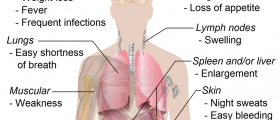
Part of the herpesvirus family, the Epstein-Barr virus is common throughout the world. Around ninety five per cent of adults have antibodies that fight against the virus, and most of the Epstein-Barr virus sufferers will go unnoticed. However, in some cases the onset of the Epstein-Barr virus can also be related to certain types of cancer. Even mild cases can be associated with serious complications. Manifestations of the Epstein-Barr virus include infectious mononucleosis, neurologic disturbances and mild childhood illnesses such as ear infections, diarrhea, and gastrointestinal problems.
Complications
Complications of the Epstein-Barr virus are quite rare, but any that do occur can be threatening to ones life if it is not properly treated. Rupturing of the spleen can occur in about one or two cases out of every one thousand. The airway can be obstructed as a result of the Epstein-Barr virus, due to an enlargement of the lymph nodes and the swelling of inflamed tissues around the airway. The Epstein-Barr virus is normally a lifelong condition, and in most cases rarely causes any other problems. The Epstein-Barr virus is also occasionally related to cancers such as Burkitt’s lymphoma, nasopharyngeal carcinoma and Hodgkin lymphoma. The Epstein-Barr virus is also associated with non-Hodgkin lymphomas in those affected by the HIV virus. Some t-cell lymphomas are also linked with the Epstein-Barr virus.
Another condition, known as post-transplant lymphoproliferative disease, is also linked to the Epstein-Barr virus. This is a category of conditions that develops in those who are taking immunosuppressive medications after an organ transplant. The Epstein-Barr virus is implicated strongly in the onset of post-transplant lymphoproliferative disease. There are also some rare hematologic conditions that are also associated with the Epstein-Barr virus. The Epstein-Barr virus has been related to the development of certain conditions, particularly those that cause abnormal growth and function of specific blood components. Examples of some of these hematologic conditions include hemophagocytic lymphohistiocytosis and lymphomatoid granulomatosis.
As has already been indicated, the Epstein-Barr virus will result in no apparent symptoms or affects on the vast majority of people. In some cases, those suffering from the Epstein-Barr virus will suffer from self-limiting illnesses such as IM. Certain additional factors are required in order to predispose individuals to the development of cancers and other serious conditions. The reasons as to why the Epstein-Barr virus causes serious problems in some people and not others is not yet entirely understood, and research is ongoing.

















Your thoughts on this
Loading...